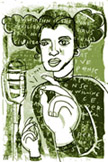
Out Loud: Preparing for a Poetry Read-Aloud
Developed by Sandy Scragg, New York City, 2002
lessons | video | poems | resources
Lesson 3: Stop Look and Listen--Hearing Other Poets Aloud
Instructional Objectives:
1) Students will be able to hear famous poets read their own poems out loud.
2) Students will listen and evaluate reading styles, which can serve as a model for their own readings.
Time Required: (1) 45-minute class session
Materials/Resources Required:
1) Online sources to hear poetry readings: Salon Audio (Dylan Thomas, Carl Sandburg, Sylvia Plath, Langston Hughes, Robert Frost, Steven Hale's small but premier collection of online readings (TS Eliot, Langston Hughes, Sir John Gielgud reading Shakespeare's sonnets, ee cummings), PBS's video collection where students can watch and listen to poets such as Amiri Baraka, Sharon Olds, Lucille Clifton, Stanley Kunitz, and Marge Piercy, Poetry Slam Videos to view the style of slam poets, and The Academy of American Poets' Online Listening Booth has an enormous collection of audio sources.
2) I also like to show students a video of a poetry reading. A good source is one of the current movies about Poetry Slams, such as Slam or Slam Nation. HBO's Def Poetry is a great resource, also. Check your local cable stations, many of which show local poetry readings. (I have a teen poetry slam as shown on Metro Arts 13, here in New York. Students love watching poets their own age.) You may also want to organize a trip to a poetry reading, or invite a poet into your classroom, which I did. Two poets that go over very well in my classroom are Sarah Jones & Beau Sia. Do a Google search for them--the students love them because they are both entertaining and inspiring.
3) If you can get a hold of the book & companion CD for Poetry Speaks, it's a fabulous resource. Poets from Alfred Lord Tennyson, Robert Browning, e.e.cummings, Dorothy Parker, Langston Hughes, Allen Ginsberg, Sylvia Plath and Gwendolyn Brooks are represented.
4) Download mp3 files of poets reading from a source like LimeWire, Audio Galaxy, or Kazaa (You can do a search for a file by poet, you'd be surprised--I found Sylvia Plath, Poe, Nikki Giovanni, and Tupac Shakur easily.)
5) I personally adore the Beat Poets and I have several CDs containing old readings of Beat Poets. When I play them for the class, the students notice that the poets are often backed up by drumbeats or piano accompaniments, and make comparisons to rap music.
Vocabulary & Key Concepts: meter, rhythm
Procedures & Activities:
1) Ask students if they have ever been to or participated in a poetry reading. If some students have, ask them to describe the experience. (I was initially surprised to learn how fond students are of poetry, and several of my students have read their poems aloud in public before. One student of mine participates in the Slam circuit, and goes by the pseudonym of "Alpo")
2) Ask students what choices can be made when deciding to read a poem--how can you read a poem, what's up to you in the reading of it? (some answers: emotional level, fast or slow, what to emphasize, volume, etc.)
3) Listen to a few poems together as a class, either several taken from online sources, or watch an excerpt from one of the Poetry Slam movies, or any other sources you may choose. Make a special emphasis on choosing diverse readers--classic poets to beat poets to hip-hop poets to slam poets, for example.
4) After listening to several poems, ask students "What did you hear?" They might not get it at first, but keep asking. (If you persist, you will get interesting responses...emotion, passion, heartbreak, sorrow, anger.) Also ask what choices the readers made in orally interpreting the poem.
5) Then direct students to other sources to listen or view poets reading (see the resource list above). Ask them to listen for the choices the poets made when choosing to read.
6) Ask students: Why do people read poems out loud? (Responses from my class: "So people can get a better sense of the poem's message," "To express your own feelings, not necessarily the poet's," "It's easier to understand the poem," and "To bring the poem to life.")
lessons | video | poems | resources